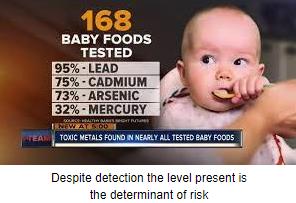 Approximately five years ago, Consumer Reports raised concerns over heavy metal contamination of infant foods. Their assays highlighted the institutional indifference of the Food and Drug Administration to the problem of lead, arsenic, and other heavy metals in a wide variety of foods and juices marketed for infants. Consumer Reports has now published on health risks based on levels of contamination of ingredients and foods. Their calculations relate the quantum of compounds assayed and the duration of intake since most heavy metals accumulate in organ systems that are especially vulnerable during infancy.
Approximately five years ago, Consumer Reports raised concerns over heavy metal contamination of infant foods. Their assays highlighted the institutional indifference of the Food and Drug Administration to the problem of lead, arsenic, and other heavy metals in a wide variety of foods and juices marketed for infants. Consumer Reports has now published on health risks based on levels of contamination of ingredients and foods. Their calculations relate the quantum of compounds assayed and the duration of intake since most heavy metals accumulate in organ systems that are especially vulnerable during infancy.
Dr. Eric Boring of Consumer Reports stated, “While concerning, these assay results are no reason to panic since risk is elevated with repeated exposure over long periods of time.” He added, “An occasional serving of even one of the foods with the highest levels is generally acceptable provided children receive a varied diet.”
 The question arises as to why an activist publication such as Consumer Reports should raise the question of heavy metal contamination in infant foods while government agencies such as the Food and Drug Administration have either ignored or countenanced the undesirable presence of heavy metals in infant foods or worse still were unaware of the issue.
The question arises as to why an activist publication such as Consumer Reports should raise the question of heavy metal contamination in infant foods while government agencies such as the Food and Drug Administration have either ignored or countenanced the undesirable presence of heavy metals in infant foods or worse still were unaware of the issue.
The problem can be ascribed in part to the dysfunctional organization structure of the FDA and the lack of concern for food aspects of the Agency’s remit. Proposed changes in structure do not entirely comply with recommendations from the Reagan-Udall Commission are not expected to materially change the culture of the agency. Protection of public health and wellbeing would be best served by a separate dedicated agency committed to food safety and nutrition.